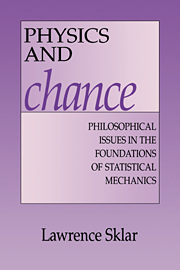Book contents
- Frontmatter
- Contents
- Preface
- 1 Introduction
- 2 Historical sketch
- 3 Probability
- 4 Statistical explanation
- 5 Equilibrium theory
- 6 Describing non-equilibrium
- 7 Rationalizing non-equilibrium theory
- 8 Cosmology and irreversibility
- 9 The reduction of thermodynamics to statistical mechanics
- 10 The direction of time
- 11 The current state of major questions
- References
- Index
5 - Equilibrium theory
Published online by Cambridge University Press: 04 December 2009
- Frontmatter
- Contents
- Preface
- 1 Introduction
- 2 Historical sketch
- 3 Probability
- 4 Statistical explanation
- 5 Equilibrium theory
- 6 Describing non-equilibrium
- 7 Rationalizing non-equilibrium theory
- 8 Cosmology and irreversibility
- 9 The reduction of thermodynamics to statistical mechanics
- 10 The direction of time
- 11 The current state of major questions
- References
- Index
Summary
Autonomous equilibrium theory and its rationalization
From Maxwell's equilibrium distribution to the generalized micro-canonical ensemble
The existence of an equilibrium state, describable by a few macroscopic parameters whose values and interrelations do not change with time, is the most fundamental thermodynamic fact for which statistical mechanics must account. A full understanding of the equilibrium situation would require a demonstration within the context of the dynamical theory of non-equilibrium that the equilibrium state exists as the “attractor” to which the dynamics of non-equilibrium drives systems, and it is that approach to the problem we shall examine in Chapters 6 and 7.
Beginning with Maxwell's first derivation of the equilibrium velocity distribution for molecules of a gas, though, there have been approaches to deriving the equilibrium features of a system that at least minimize considerations of the underlying micro-dynamics and of the time evolution toward equilibrium that one hopes to show is driven by it. As we saw, Maxwell's first derivation of the equilibrium distribution relied solely on the assumption that the components of molecular velocity in three perpendicular directions were probabilistically independent, an assumption clearly recognized by Maxwell as “precarious.”
Whereas Boltzmann's first essay on equilibrium treated it from the general dynamical perspective, using the kinetic equation and H-theorem to attempt to show that the equilibrium distribution was the unique stationary distribution, he later developed, in the course of his probabilistic response to the earlier criticisms of the kinetic equation and H-theorem, his new method applicable to the case of the ideal gas.
- Type
- Chapter
- Information
- Physics and ChancePhilosophical Issues in the Foundations of Statistical Mechanics, pp. 156 - 195Publisher: Cambridge University PressPrint publication year: 1993



